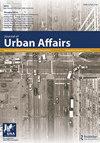Gendering grassrootscapes: The sociospatial relations of lower working-class women dwelling in the socialist Workers’ New Villages in post-reform Shanghai
IF 1.9
3区 经济学
Q2 URBAN STUDIES
引用次数: 0
Abstract
ABSTRACTWomen of the lower working-class in Shanghai are seemingly invisible in Chinese urban scholarship. Drawing on fieldwork conducted between 2017 and 2021 in Shanghai, this article sheds light on the social lives of lower working-class women dwelling in the Workers’ New Villages in the wake of rapid urbanization. Mounting a threefold conceptual exploration of grassroots urbanism, genderscapes, and guanxi (social connectivity), the article develops and coins the term grassrootscapes to explicate grassroots women’s sociospatial relations with housing units, the community, and the city. Probing these multi-layered horizons to trace women’s life trajectories and gendered experiences, the article discerns how sociospatial dynamics of grassrootscapes are produced under a socialist system, in which women’s day-to-day suffering is a by-product of market reforms. Socialist workers’ housing is employed as a case study to show how the conceptualization of grassrootscapes can be a useful tool to examine the social transformation brought about by the drastic changes in urban policies in globalizing cities.KEYWORDS: Chinagenderurbanization AcknowledgmentsThe authors sincerely thank our research participants and local officials for their time and support, making this research possible. The authors also wish to express their gratefulness to the editors and reviewers for their insightful comments. Last, we must thank Professor Linda Peake for her enormous support of this work.Disclosure statementNo potential conflict of interest was reported by the author(s).Notes1. This research is part of a transnational research project, “Urbanization, Gender and the Global South: A Transformative Knowledge Network” (GenUrb) (Principal Investigator: Linda Peake), which focuses on grassroots women living in six selected cities in the Global South including Cochabamba, Delhi, Georgetown (Guyana), Ibadan, Ramallah, and Shanghai (https://genurb.apps01.yorku.ca).2. This article purposely uses the term housing unit instead of apartment (gongyu), as an apartment is a housing type commonly known as commodity housing (shangpinfang) and thus is discursively attached to the new urban middle-class.3. To protect the confidentiality of the women and their families, we decided to use pseudonyms, and the community is renamed Community X to ensure their anonymity.4. Since the post-reform period began, people with life-threatening illnesses have also had to endure heavy medical costs due to the marketization of medical and health care, hence the common phrase, “falling into poverty due to illness” (yinbing zhipin).5. The inductive coding process yielded 30 parent-codes and over 200 child-codes.Additional informationFundingThis research is funded by the Social Sciences and Humanities Research Council of Canada (SSHRC) Partnership Grant, “Urbanization, gender and the global south: A transformative knowledge network” [File number 895-2017-1011; PI: Linda Peake].Notes on contributorsPenn Tsz Ting IpPenn Tsz Ting Ip is senior lecturer at the School of Arts and Social Sciences (A&SS) at Hong Kong Metropolitan University (HKMU). Before joining HKMU, she worked as assistant professor at the Department of Cultural Industry Management, School of Media and Communication, Shanghai Jiao Tong University (2019–2023). She is a core member of the SSHRC-funded partnership project “Urbanization, Gender and the Global South: A Transformative Knowledge Network (GenUrb),” based at the City Institute, York University, Toronto. Her research interests include gender and women’s studies, urban studies, migration studies, and affect theory. She is the first author of The Ordinary Women: A Qualitative Research on the Workers New Villages in Shanghai (Chinese) (2021). Her works have been published by the European Journal of Cultural Studies, Inter-Asia Cultural Studies, Global Media and China, among others. Ip is the founder of a collaborative research project, “HEResearch: Global Distinguished Scholar Lecture Series.”Tsung-yi Michelle HuangTsung-yi Michelle Huang is professor of geography at National Taiwan University. Her works on East Asian urban cultures have been published in the Quarterly Review of film and video, the Journal of Narrative Theory, positions: east asia cultures critique, Inter-Asia Cultural Studies, among others. She is the author of Walking Between Slums and Skyscrapers: Illusions of Open Space in Hong Kong, Tokyo and Shanghai (2004), Articulating New Cultural Identities: Self-Writing of East Asian Global City-Regions (Chinese) (2008), and Happiness and Distress in China and Hong Kong: The Cultural Politics of Emotion in Developmentalism (Chinese) (2020).Jing WangJing Wang is associate professor at the Department of Cultural Industry Management, School of Media and Communication, Shanghai Jiao Tong University. Her research focuses on urban cultures and cultural spaces. She is the author of Restructuring Cultural Industries’ Spatial Relationship: The Development of Cultural Industries in Yangtze River Delta (Chinese) (2015) and City, Cultural Consumption and Space: Based on the Investigation of Shanghai Residents (Chinese) (2018). She is also the principal investigator of the project titled, “The Research on Cultural Dynamics for Urban Development in Shanghai,” funded by the Shanghai Planning Office of Philosophy and Social Sciences.性别化的基层景观:改革后上海社会主义工人新村下层工人妇女的社会空间关系
著有《重构文化产业空间关系:长三角文化产业发展》(2015)、《城市、文化消费与空间:基于上海居民的调查》(2018)。主持上海市哲学社会科学规划办公室“上海城市发展的文化动力研究”项目。
本文章由计算机程序翻译,如有差异,请以英文原文为准。
求助全文
约1分钟内获得全文
求助全文
来源期刊

Journal of Urban Affairs
URBAN STUDIES-
CiteScore
5.40
自引率
4.80%
发文量
156
期刊介绍:
Focusing on urban research and policy analysis, the Journal of Urban Affairs is among the most widely cited journals in the field. Published for the Urban Affairs Association, the journal offers multidisciplinary perspectives and explores issues of relevance to both scholars and practitioners, including: - Theoretical, conceptual, or methodological approaches to metropolitan and community problems - Empirical research that advances the understanding of society - Strategies for social change in the urban milieu - Innovative urban policies and programs - Issues of current interest to those who work in the field and those who study the urban and regional environment
 求助内容:
求助内容: 应助结果提醒方式:
应助结果提醒方式:


